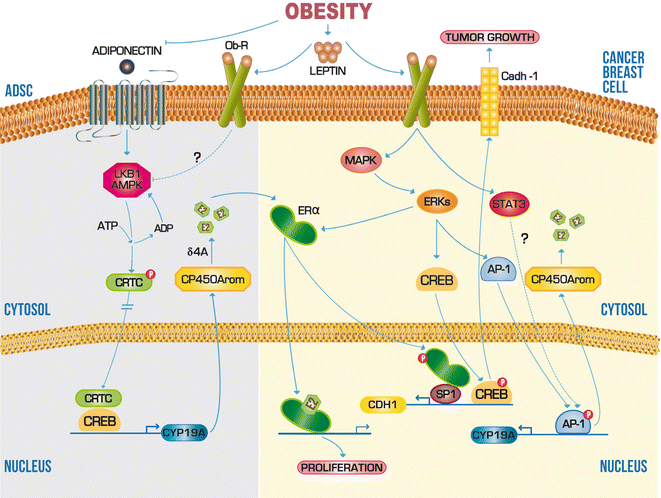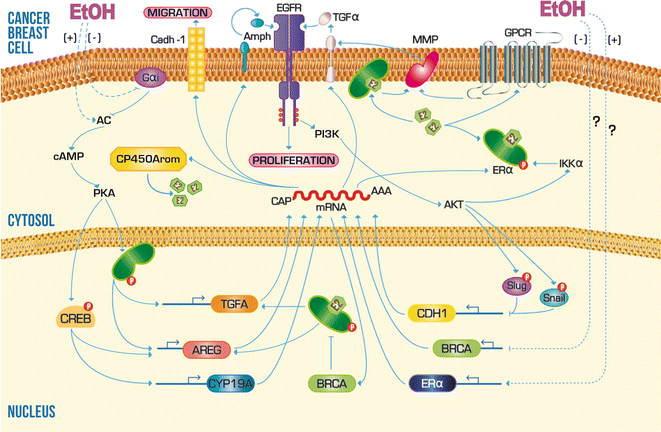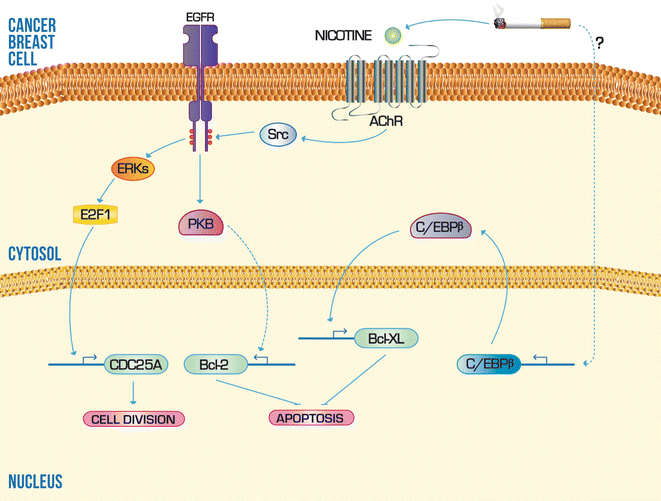Effects of the lifestyle habits in breast cancer transcriptional regulation
- PMID: 26877711
- PMCID: PMC4752785
- DOI: 10.1186/s12935-016-0284-7
Effects of the lifestyle habits in breast cancer transcriptional regulation
Abstract
Through research carried out in the last 25 years about the breast cancer etiology, it has been possible to estimate that less than 10 % of patients who are diagnosed with the condition are carriers of some germline or somatic mutation. The clinical reports of breast cancer patients with healthy twins and the development of disease in women without high penetrance mutations detected, warn the participation more factors in the transformation process. The high incidence of mammary adenocarcinoma in the modern woman and the urgent need for new methods of prevention and early detection have demanded more information about the role that environment and lifestyle have on the transformation of mammary gland epithelial cells. Obesity, alcoholism and smoking are factors that have shown a close correlation with the risk of developing breast cancer. And although these conditions affect different cell regulation levels, the study of its effects in the mechanisms of transcriptional and epigenetic regulation is considered critical for a better understanding of the loss of identity of epithelial cells during carcinogenesis of this tissue. The main objective of this review was to establish the importance of changes occurring to transcriptional level in the mammary gland as a consequence of acute or chronic exposure to harmful products such as obesity-causing foods, ethanol and cigarette smoke components. At analyze the main studies related to topic, it has concluded that the understanding of effects caused by the lifestyle factors in performance of the transcriptional mechanisms that determine gene expression of the mammary gland epithelial cells, may help explain the development of this disease in women without genetic propensity and different phenotypic manifestations of this cancer type.
A través de la investigación realizada en los últimos 25 años en torno a la etiología del cáncer de mama, ha sido posible estimar que menos del 10 % de las pacientes que son diagnosticadas con la enfermedad son portadoras de alguna mutación de línea germinal o somática. Los informes clínicos de pacientes de cáncer de mama con gemelas saludables y el desarrollo de la enfermedad en las mujeres sin mutaciones de alta penetrancia detectadas, advierten la participación de otros factores en el proceso de transformación. La alta incidencia de adenocarcinoma de mama en la mujer moderna y la necesidad urgente de nuevos métodos para la prevención y detección temprana han exigido una mayor información en relación al papel que el medio ambiente y el estilo de vida tienen en la transformación de las células epiteliales de la glándula mamaria. La obesidad, el alcoholismo y el tabaquismo son factores que han demostrado una estrecha correlación con el riesgo de desarrollar cáncer de mama. Y aunque estas condiciones pueden afectar distintos niveles de regulación celular, el estudio de sus efectos en los mecanismos de regulación transcripcional y epigenética, es considerado fundamental para un mayor entendimiento de la pérdida de identidad de las células epiteliales durante la carcinogénesis de este tejido. El objetivo principal de esta revisión fue establecer la importancia de los cambios que ocurren a nivel transcripcional en la glándula mamaria, como consecuencia de una exposición aguda o crónica a productos nocivos, tales como los alimentos que favorecen la obesidad, el etanol y los componentes del humo del cigarro. Al analizar los principales estudios relacionados con el tema, se ha llegado a la conclusión de que la comprensión de los efectos causados por los factores de estilo de vida sobre el desempeño de los mecanismos de regulación transcripcional responsables de la expresión génica de las células epiteliales de la glándula mamaria, pueden ayudar a explicar el desarrollo de esta enfermedad en las mujeres que no son genéticamente propensas así como las diferentes manifestaciones fenotípicas de este tipo de cáncer.
Keywords: Breast cancer; Ethanol; Obesity; Tobacco; Transcription.
Figures



References
Publication types
LinkOut - more resources
Full Text Sources
Other Literature Sources

